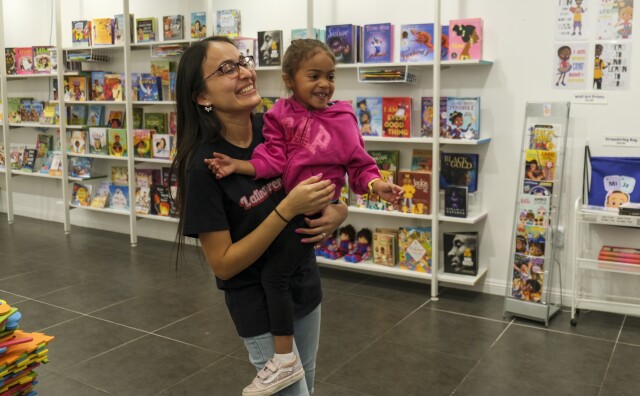Armed with clipboards, hats and water, community health workers Alejandra Gonzalez and Emiliana Gallardo start knocking on doors off 92nd street in Watts.
Gonzalez and Gallardo are health workers with the Children’s Institute, a nonprofit with a campus in Watts, that provides services like early childhood education and mental health support. The organization, and nine other nonprofits, are partnering with the county’s public health department in 10 neighborhoods across the county to go door-to-door and connect people to health care and social services they might need.
“Most of the time, parents are at work or they’re not home, so we try to come out at different times of the day,” Gonzalez said.
No one answers at the first home this morning, for example, so they leave a door hanger with their information. Gonzalez says they’ll come back a couple more times.
The goal is to bring health workers to people’s homes, ask them what they need, and deliver, said James Miller, regional health representative with the L.A. County Department of Public Health. He said the current 10 neighborhoods have been identified as “high need” communities that are low-income, and have low health outcomes.
“[It’s] not to add an undue burden to those folks that are at home, between work, taking care of kids, taking care of parents,” he said. “We wanted to meet them where they were at and bring the services to them.”
How was the program developed?
Barbara Ferrer, the county’s public health director, says the community health teams are modeled off programs in Costa Rica and Cuba. The teams focus on “micro-neighborhoods” in L.A. County of about 10,000 homes.
She said the project comes out of lessons learned from door-knocking during COVID.
“It was super clear to all of us, especially in under-resourced communities, how many families were not connected to the kinds of services they wanted or needed, including health care,” she said.
With funding assistance from a Centers for Disease Control and Prevention grant, the community health teams pilot will run in these same neighborhoods for the next five years. The teams will go back to homes each year to conduct health assessments and surveys, allowing for the county to collect and analyze data about community health trends.
Ferrer says if it’s successful, the program could expand to other neighborhoods.
“In my dream world, we're highly effective, there's some immediate benefits because we are connecting people to the things that they need and it shows up, um, pretty quickly and some markers of health,” she said. The hope is to have better health outcomes on conditions like diabetes or hypertension, she said.
What problems do people have?
Along their route, Gallardo and Gonzalez meet resident Hector Arroyo in front of his house. They ask them if there is anything he needs, like food, health insurance or dental services.
“I appreciate that, but we’re good. I go to a couple of food banks and my kids go to USC dental, and our insurance covers it,” he tells them.
They ask him other questions, like if his kids are under 6 since the organization has early education and home visitation services. His kids, he says, are older. They continue on with the survey.
Health care wise — he says things are good. He reversed his diabetes recently through lifestyle changes and herbal medicines. They ask if he needs help with anything else.

“We just need money, like a lot of it. Like a whole truckload,” he says with a laugh. Arroyo is being humorous, but Gonzalez immediately follows up.
“Would you say that you need any assistance with utilities like paying for your gas or electricity or even rental assistance?” she asks.
Arroyo says that’s something he actually could use help with, as he fell behind on their light bill recently.
“It's just the financial assistance is the toughest right now. I have two big growing boys, I got an elderly woman here — my mom's here. And we gotta try to make it by. And the bills don't wait, and nothing's cheap anymore,” he says.
Gonzalez says they can send him information to organizations that can assist with utility payments, and they text him later that day. Arroyo wasn’t sure what the door-knockers were up to at first, but told us he appreciated them canvassing his neighborhood.

““People are insecure about where to go, who to believe, who can they trust … so, it's good that they're coming out,” he said.
What range of services are offered?
The door knockers have also helped residents make appointments for their physical or mental health.
-
The pilot program has rolled out to neighborhoods in Bell, Boyle Heights, Cudahy, El Monte, Florence-Firestone, Harvard Park, Huntington Park, Lancaster, Lincoln Heights, Mission Hills, Pacoima, Rosemead, San Fernando, South El Monte, South Gate, South Park, Sylmar, Watts, West Vernon, and Wilmington.
-
You can see the full list here and contact your local representative.
-
Want to get involved? Organizations interested in partnerships can reach out to the Department of Public Health.
Maria Trujillo, another community health worker with the Children’s Institute, met a mother several weeks ago whose family was in crisis. Her daughter had recently been a victim a sexual assault.
“They were struggling to find support for her daughter who was struggling with the, not only assault, but also the pressure and stress of the investigative process that the police department was about to begin,” Trujillo said.
Trujillo was able to connect the daughter to mental health counseling through the Children’s Institute, and also enroll the mother in a parenting support program. She says it was showing up at the right place at the right time.
“I think that's the case a lot of the times. It's just the timing, just having someone come to you versus you having to navigate yourself,” she said.












